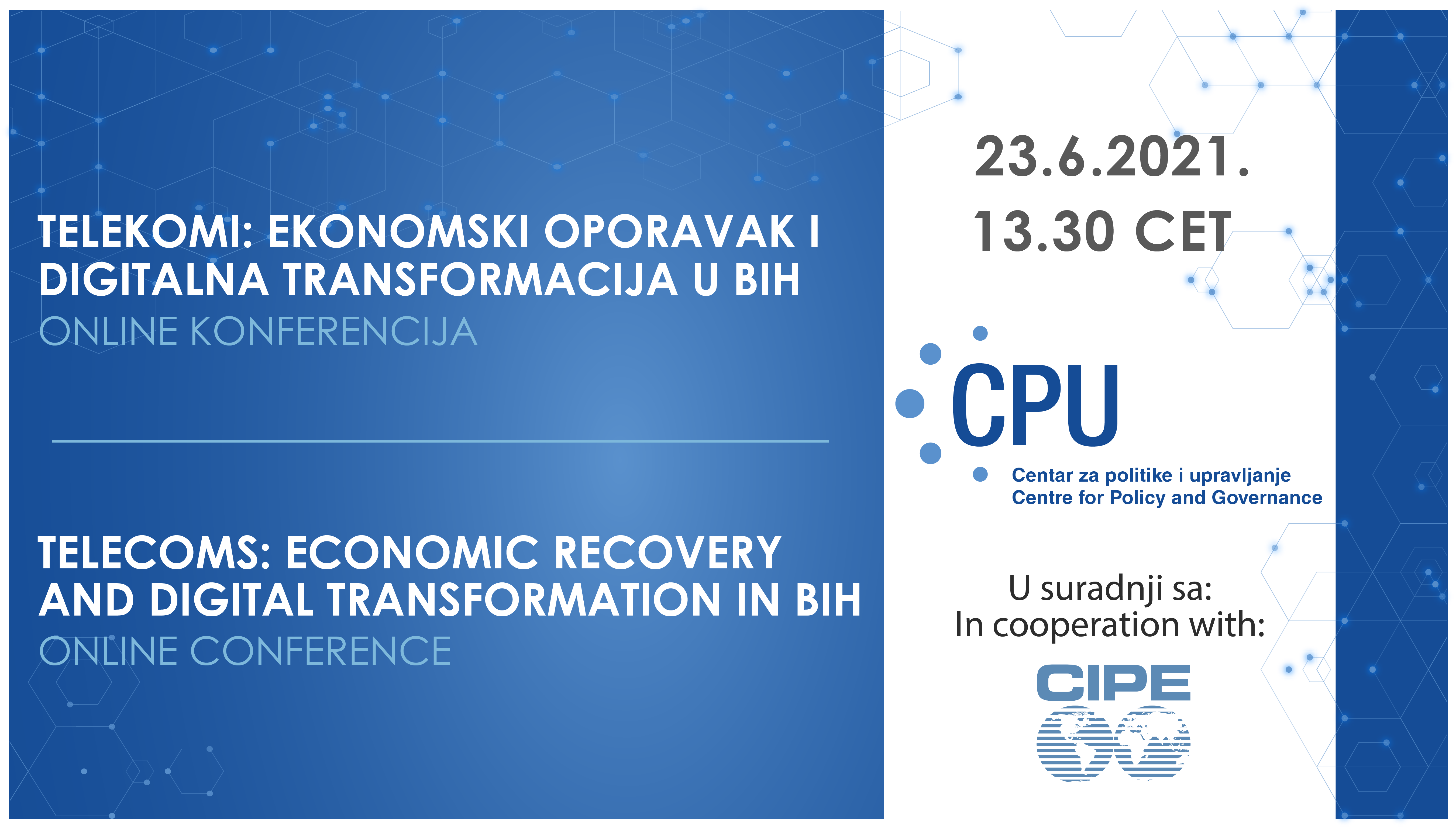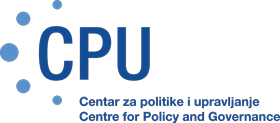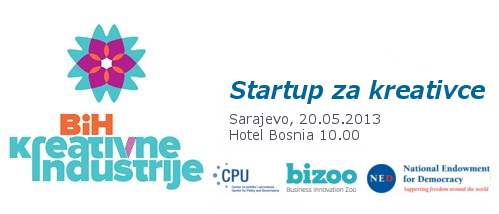
REGISTER HERE
Response to Crisis: Maximizing telecoms’ contribution to the economic recovery and digital transformation in BiH
June 23rd, 2021. / 13.30 – 18.00 CET
Sarajevo, Bosnia and Herzegovina
Zoom / Youtube Stream
AGENDA
13.30 – 13.45 Opening remarks, Haris Abaspahić, CPU
13.45 – 15.30 Panel 1: Telecommunications – Strategic Outlook
What are the global and regional trends affecting the development of the telecommunication industry?
13.45 – 14.00 Paul Harrison, Acting Director, Division for International Communications and Information, U.S. Department of State
14.00 – 14.15 Philippe Gerard, Adviser for Capacity Building and Cooperation with Third Countries, Directorate-General for Communications Networks, Content and Technology (DG CNECT), European Commission
14.15 – 14.30 Terry Halvorsen, General Manager for Client & Solutions Development, Federal and Public Sector, IBM US
14.30 – 14.45 Sanja Ribar, Regional Senior Manager for Telecoms, Ernst & Young
14.45 – 15.30 Discussion
Moderator: Haris Abaspahić, CPU
15.40 – 17.45 Panel 2: Strategic Choices and Timely Decision Making, Evolving Regulatory Framework and Market Realities
The current trends in the sector in BiH. Challenges caused by the COVID-19 pandemic and the need for digital economy advancements. How is the need for restructuring state-owned telecoms affecting the development of the sector in BiH?
15.40 – 15.55 Nedžad Branković, Deputy Minister, Ministry of Communications and Transport of BiH
15.55 – 16.10 Miloš Šolaja, Member of the Council, Communications Regulatory Agency of BiH
16.10 – 16.25 Aida Soko, Advisor to Prime Minister of FBiH
16.25 – 16.40 Adnan Huremović, Executive Director for Technology and Service Development, BH Telecom
16.40 – 16.55 Alen Muslić, Executive Vice President, ZIRA
16.55 – 17.45 Discussion
Moderator: Adis Muhović, CPU
17.45 – 18.00 Closing remarks, Haris Abaspahić, CPU
Audience: Relevant ministries, members of relevant committees of state and entity levels parliaments, relevant development partners, NGOs, unions and business associations, academia, media, and general public.
To participate in the ZOOM conference you can apply at: https://bit.ly/CPUREG
You can also follow the conference live stream through the CPU YouTube channel, available at: youtube.com/user/cpubih.
About the conference:
Telecommunications are rapidly changing the ways we live, work, learn and entertain. Today, telecoms are key players to provide an enabling environment for the digital transformation of both businesses and governments. COVID-19 pandemic made this fact even more relevant.
Accessibility, reliability, and affordability of high-speed internet and digital services have been a precondition for maintaining business activities and public services. The pandemic has increased the demand for telecom services globally. Looking forward, rapid technological advancements will drive the economic post-pandemic recovery. Transitioning to 5G and the adoption of new technologies such as artificial intelligence and the internet of things will require telecoms to quickly adapt, to drive new values to economies and societies.
In recent years, telecom operators in Bosnia and Herzegovina have made progress in infrastructure development, including expanding 4G networks. At the same time, the financial performances of the telecommunication industry have worsened. Since 2015, the total industry income declined by almost 15% to 633 million EUR in 2019, followed by decline of profit margins and investments increase of main telecoms in the country.
In 2019, the IMF reported that two main state-owned telecoms face low financial risks, but the value of both companies declined significantly, and that the sustainability of their business models may be in question. The debate about the future of those companies has been going on for over a decade now. While the Government of FBiH showed commitment in recent years to address the weaknesses of the current business models of both companies, no decisions have been made yet.
The purpose of this virtual conference is to promote timely and evidence-based policy debate about the ways to maximize the contributions of telecoms to the economic recovery and digital economy advancements in the country. The conference is organized by Centre for Policy and Governance (CPU), supported by Centre for International Private Enterprise (CIPE) US. The conference brings together decision makers, representatives of the telecom industry and international expertise in order to address the following questions:
- What are the key global and regional trends that affect the development of the telecommunication industry in BiH?
- How did telecoms respond to the recent challenges caused by the COVID-19 pandemic and rapid digital transformation needs?
- What are the key challenges and opportunities for leading telecoms to optimize their contributions to productivity gains and digital economy advancements in BiH?
- Whether the need for restructuring state-owned telecoms is hindering the development of the sector?


